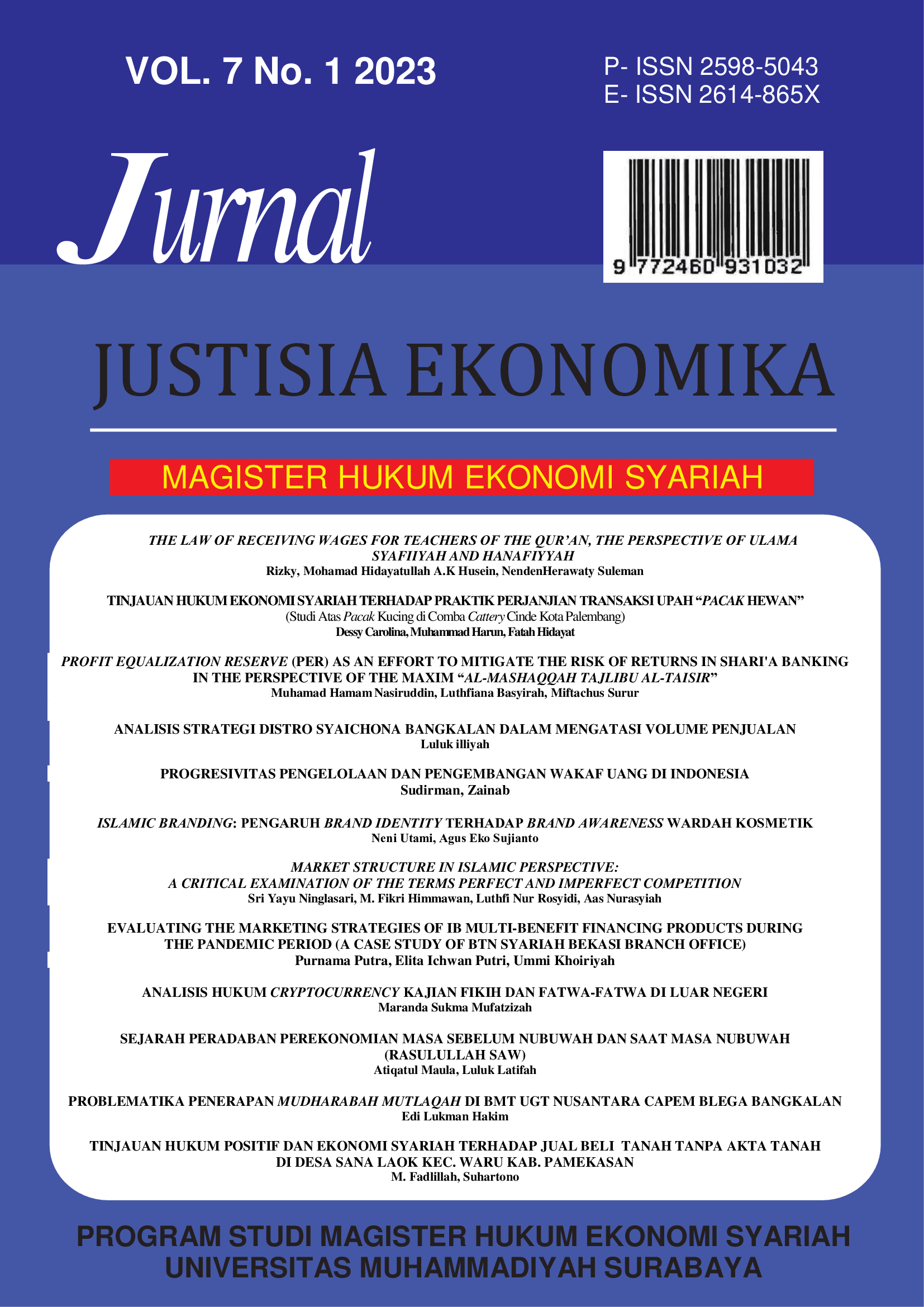MARKET STRUCTURE IN ISLAMIC PERSPECTIVE: A CRITICAL EXAMINATION OF THE TERMS PERFECT AND IMPERFECT COMPETITION
DOI:
https://doi.org/10.30651/justeko.v7i1.18132Abstract
The purpose of this study is to examine the terms "perfect" and "imperfect" competition in the market structure from an Islamic economic perspective. This study employed a qualitative approach to library research as its methodology. The results of the literature review indicate that the structure of perfect competition has a close relationship with the Islamic market concept. This proximity is reflected in the price, which is determined according to the hadith of the Prophet Muhammad by supply and demand. In addition, it is believed that perfect market competition is a market structure that can benefit both consumers and producers. Moreover, elements of imperfect competition that can oppress consumers, such as monopolies, oligopolies, and monopolistic practices, must be avoided. In Islamic economics, however, there is no concept of competition because it is synonymous with war, fighting, and dumping, so the term "competition" in the concept of market structure is inappropriate. For this reason, a new concept is required, namely the ta'awun market, in which the market in Islamic economics should be a place and a means of mutual assistance.
Keywords:Â Market structure, Islamic perspective, perfect competition, imperfect competition
Â
References
Afan, A. Z. (2014). Pasar Persaingan Sempurna dalam Perspektif Ekonomi Islam. Ummul Quro, 4(2), 88–104.
Al Arif, M. N. R. (2016). Monopoly and Ikhtikar in Islamic Economics. Shirkah: Journal of Economics and Business, 1(3), 299–310. https://doi.org/10.22515/shirkah.v1i3.37
Ali, M. A., Rahman, M. K., Rahman, M., Albaity, M., & Jalil, M. A. (2015). A review of the critical factors affecting Islamic market mechanisms in Malaysia. Journal of Islamic Marketing, 6(2), 250–267. https://doi.org/10.1108/JIMA-05-2014-0039
Chapra, M. U. (1990). Towards a Just Monetary System. In JKAU: Islamic Econ.
Farida, U. J. (2012). Telaah Kritis Pemikiran Ekonomi Islam terhadap Mekanisme Pasar dalam Konteks Ekonomi Islam Kekinian. La_Riba, 6(2), 257–270. https://doi.org/10.20885/lariba.vol6.iss2.art7
Irawan, M. (2015). Mekanisme Pasar Islami dalam Konteks Idealita dan Realita (Studi Analisis Pemikiran Al-Ghazali dan Ibnu Taimiyah). Jebis, 1(1), 67–78.
Islam, M. S. (2019). Elimination of Excess Capacity in Monopolistic Competition: An Alternative Approach. International Research in Economics and Finance, 3(1), 1–9. https://doi.org/10.20849/iref.v3i1.568
Karim, A. A. (2015). Ekonomi Mikro Islami. PT Raja Grafindo Persada.
Lidyana, N. (2016). Pasar Persaingan Sempurna dalam Islam. Iqtishodiyah, 2(2), 1–14.
Nurdania, N. (2019). Mekanisme Pasar Dalam Konteks Idealita Dan Realita (Analisis Pemikiran Abu Yusuf dan Ibn Khaldun). BALANCA : Jurnal Ekonomi Dan Bisnis Islam, 1(1), 1–15. https://doi.org/10.35905/balanca.v1i1.1036
Rahmi, A. (2015). Mekanisme Pasar dalam Islam. Jurnal Ekonomi Bisnis Dan Kewirausahaan, 4(2), 177–192. https://doi.org/10.26418/jebik.v4i2.12481
Riyardi, A., & Mardalis, A. (2013). Promoting A Market Competition: An Islamic Perspective. Proceeding Seminar Nasional Dan Call for Papers SANCALL, 235–244.
Sekaran, U., & Bougie, R. (2016). Research Method for Business Textbook: A Skill Building Approach. In John Wiley & Sons Ltd.
Sugiyono. (2007). Metode Penelitian Kuantitatif Kualitatif dan R&D. Alfabeta.
Triono, D. C. (2011). Ekonomi Islam Madzhab Hamfara. Al-Azhar Press.
Ulhaq, M. Z., & Achiria, S. (2018). Pemikiran Ibnu Taymiyyah tentang Mekanisme Pasar. Iqtishodia: Jurnal Ekonomi Syariah, 3(1), 58–71.
Downloads
Published
How to Cite
Issue
Section
License
HAK CIPTA
Penulis yang mengirimkan artikel dalam jurnal Justisia Ekonomika harus memahami dan menyetujui persyaratan tentang hak cipta jurnal Justisia Ekonomika sebagai berikut:
1. Hak Cipta tulisan / artikel yang diterbitkan di jurnal Justisia Ekonomika otomatis menjadi hak pengelola jurnal atau publisher
2. Meskipun Hak Cipta atas tulisan yang telah diterbitkan di jurnal Justisia Ekonomika adalah menjadi haknya publisher, tetapi penulis masih mempunyai hak untuk : a). Penulis boleh meng-upload di repository kampus, b). Penulis boleh meng-upload di webnya sendiri, c). Penulis boleh meng-upload di google schoolar, orchid dan sinta
LISENSI
Lisensi atas tulisan / artikel yang diterbitkan di jurnal Justisia Ekonomika adalah menggunakan Creative Commons dengan atribusi CC-BY-NC 4.0






















